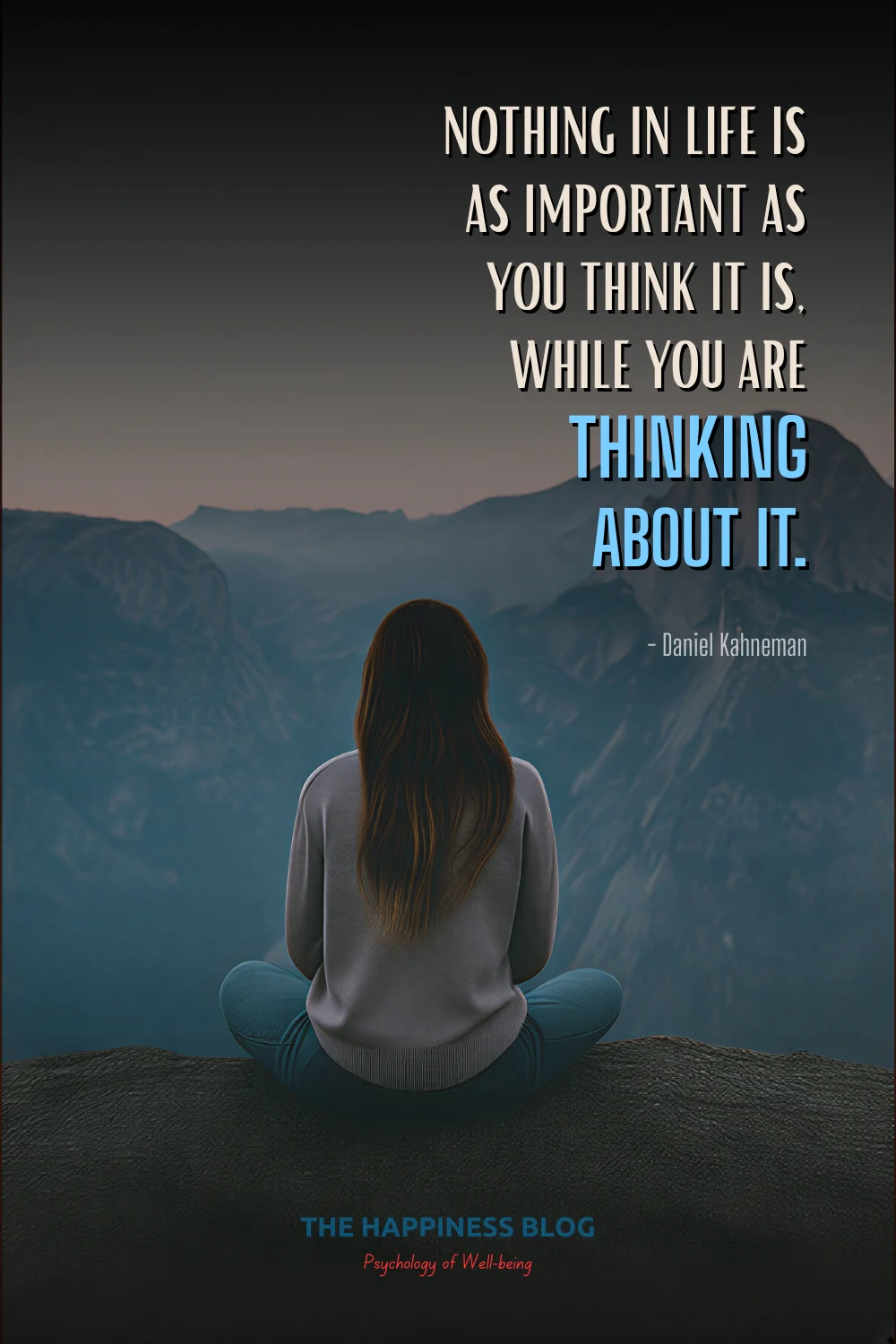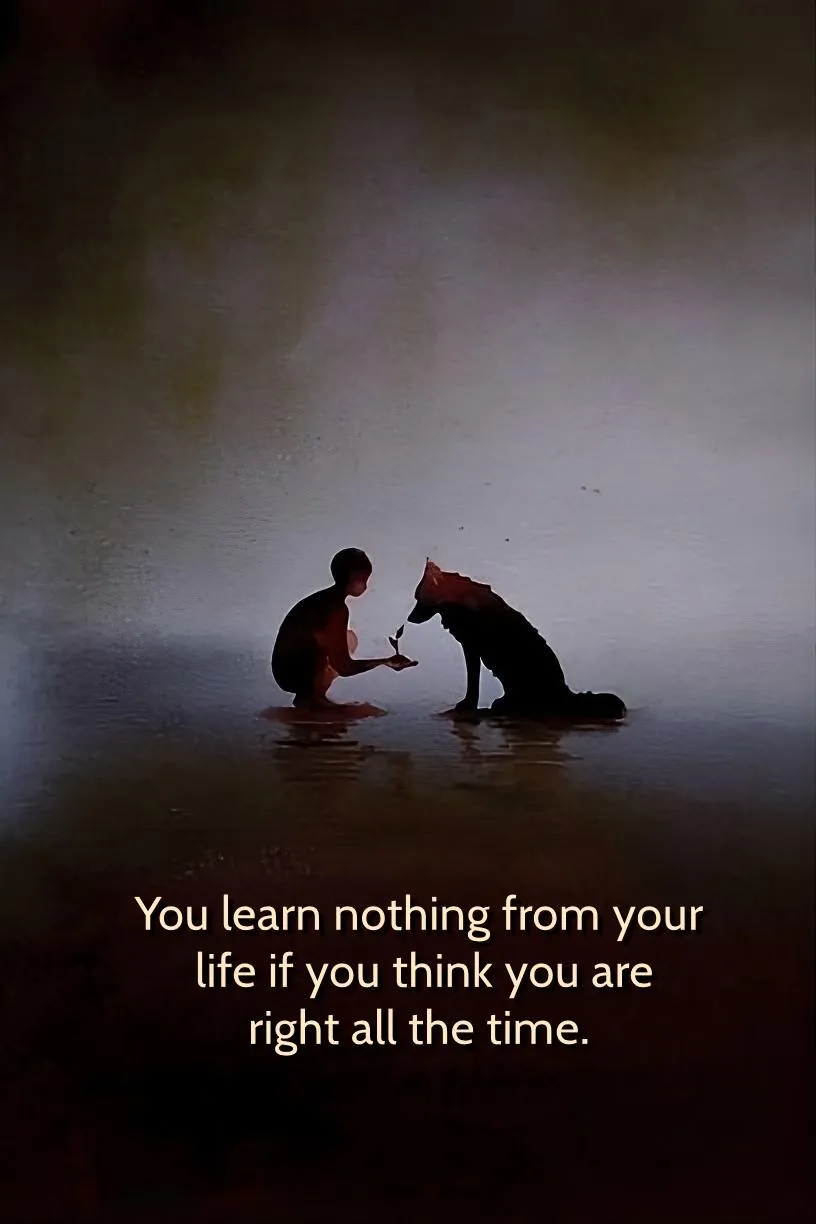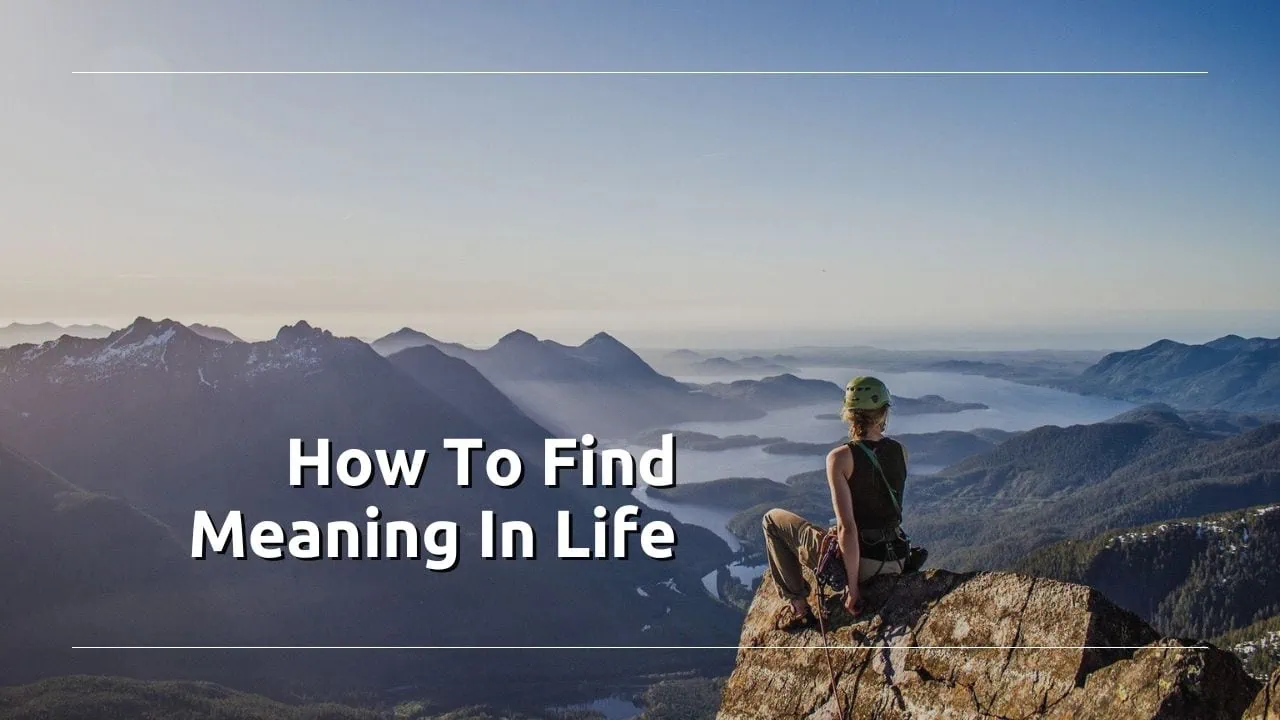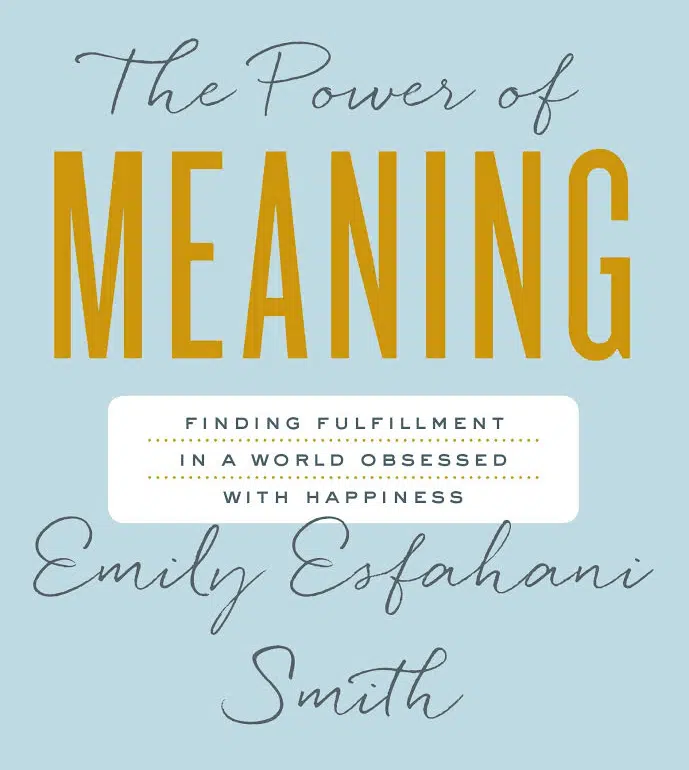Today's Thursday • 13 mins read
When life feels like an endless loop, you begin questioning the point of it all. You wake up, do what’s expected, but still feel missing from your own story.
The days move like clockwork. The spark is gone. You may find yourself asking:
- “What will my legacy be?”
- “Why do I get up in the morning?”
- “Would anyone notice if I disappeared?”
Psychologists call this an existential vacuum. A state where nothing feels meaningful. Almost like moving through life without a map.
Many reach this point after a breakup, burnout, a major transition, or a bigger-than-life loss.
“When you don’t know what you’re living for, you don’t care how you live from one day to the next.” ― Ivan Goncharov
Meaning is a human need, as essential as love or safety. Research shows that people who feel their life has meaning are often calmer, more satisfied, and even live longer. They still struggle, but that struggle feels tied to a larger story.
Read on to know how to find, or rebuild, meaning when life feels empty, repetitive, or directionless.
How To Find Meaning In Life When Life Is A Struggle
When every day seems to be the same as the one before, it can make you wonder what life really means.
Not having found your life’s meaning can be alienating. The person may isolate themselves and become so self-contained that they feel awkward asking for help.
Here’s what to do if you or someone you know is struggling to find meaning in their life:
1. Stop Taking Life Too Seriously
It’s easy to believe if you could fix your job, health, and relationships, you’d feel okay again. But life doesn’t need to be perfect for it to feel meaningful.
One way to zero in on what really matters in your life is to stop taking life too seriously.
Stop trying to control everything. Nothing in life is as important as you think it is. No one thinks of you as much as you think they do.

Let go of your judgments of how things should be, and instead, let life happen.
- Start small. Begin with what’s already in front of you. Notice tiny pleasures: a warm meal, the way your pet greets you, the humor in a shared awkward moment.
- Set fewer internal demands. Trying hard all the time to “figure out your life” creates stress. Take a lighter approach. Slow days, dull days, even sad days are part of life’s texture. Don’t resist the rhythm.
- Cultivate humor. Laughing at your struggles can disconnect you from perfectionism. Humor helps you keep perspective when everything feels heavier than usual.
Meaning grows in the present, not in trying to wait for perfection. Embrace life’s natural flow, allow the present moment to happen at ease
2. Build Your “Ikigai,” Piece by Piece
The Japanese idea of Ikigai often translates as “a reason for being.”
Your Ikigai sits at the intersection of what you love, what you’re good at, and what benefits others. It doesn’t need to be your full-time job.
Your ikigai can be a practice, a project, an act of devotion, or a blend of things.
Here’s how to discover it:
- List what genuinely energizes you. What makes time feel different?
- Think of talents or quirks people have thanked you for.
- Ask: What do I do that helps someone else, even in a small way?
You don’t have to turn every passion into a profession. A part-time ritual, a side passion, or a creative hobby can still give life direction and personal meaning. Ikigai isn’t a fixed destination. It evolves. Let it change with you.
- Read this to Find Your “Ikigai” to a Happier Life.

3. Choose People Who Add Depth, Not Drama
We’re wired for connection. Yet the quality of relationships matters far more than the number. A life full of shallow or draining ties can still feel lonely.
Meaningful relationships don’t have to be many. They just need to be real.
Research suggests that a few secure, reliable connections do more for emotional stability than large circles of low-trust friendships.
Try this approach:
- Send a message to someone who brings out your best.
- Set boundaries with people who constantly criticize others or gaslight you.
- Notice how you feel after spending time with someone: scattered and drained, or calm and seen?
Upgrade your circle. Let go of toxic people in your life. Don’t chase popular people, but choose those who make space for your truth.
“You are an average of the five people you spend the most time with.” – Jim Rohn
4. Do Work That Feeds Your Values
Don’t confuse meaning with motivation. Motivation fuels action. Meaning fuels why action matters.
Whether you’re a student, a parent, a freelancer, or a team leader, the key question is: Does any part of what I do connect to what I care about? If yes, you’re building meaning, even if the external rewards fluctuate.
Here’s how to live your values through your work:
- Write down three core values. Integrity? Curiosity? Kindness?
- Each day, pick one task that reflects at least one of those values.
- Break any big change (e.g., job shift, certification) into 30-day chunks.
Values-based work feels personal. It creates resilience.
In fact, people who do work that aligns with intrinsic goals report higher satisfaction than those driven by money or status alone.
Try creating a simple mission statement for your current life season. Is it about skill growth, self-mastery, or community impact?
Not perfect, just honest goals can guide your priorities more than any to-do list.
“Choose one dream. Create a realistic plan. Then act.”

5. Be Kind. Give More Than You Take
Altruism has a subtle way of brightening the mind. Helping someone else, without expecting anything back, reminds you that your life can affect another’s, even in quiet ways.
Start small, and keep it meaningful:
- Help a student practice English.
- Share your expertise with a group for free.
- Check in on a neighbor who lives alone.
Studies show that volunteering or acts of service reduce isolation and increase life satisfaction. Even “micro-volunteering” (a 15-minute goodwill task or a weekly digital contribution) can create a positive shift in mindset.
You don’t need a heroic rescue. You just need consistent kindness that fits your nature.
More on the science of selfless acts here: Altruism (Stanford Encyclopedia).

6. Stay Open To New Experiences
New experiences give your brain fresh challenges and create moments of growth.
Push yourself to try something new at least once a week or once a month. The size of the action matters less than the willingness to explore.
Try these to keep novelty alive:
- Step out of your comfort zone gradually but consistently.
- Make a “curiosity list” of things you want to learn or experience.
- Practice “mindful novelty.” Experience familiar places, meals, or tasks as if it’s the first time.
- Refresh routines: take a different route, experiment with a new flavor, or switch up your environment.
Growth often comes from simple changes you’re willing to embrace.
7. Find Time To Do Meaningful Things
“You’ll always be busy. Make time for things that matter while you’re busy.”
Design a life of intention. Intentional living starts with knowing what feels meaningful.
Take ten minutes to write down five things you want to do this year that would truly make you happier. Keep the list where you’ll see it often.
Track your time for a week to see where your hours are really going. Get rid of the time-wasters, both actions and people.
Instead of just managing your time, manage your energy. Do your most value-aligned tasks when you have the most energy.
Round out your day with simple practices:
- Block off “non-negotiable” slots for value-based activities.
- Use the two-minute rule: if something takes under two minutes, do it now.
- Keep a “done list” to remind yourself what went right, not just what needs doing.
[Try the Stoic meditative practice “View From Above” to find what gives meaning to your life.]
The Psychology of Meaning: Four Pillars That Hold Us Up
Positive psychologist Emily Esfahani Smith, in her debut book The Power of Meaning: Crafting a Life That Matters, points out the four pillars of meaning in life:
- Belonging: The urge to belong to a relationship, to a group, to a community, or to an ideology.
- Purpose: The drive and mission to contribute to society and make the world a better place.
- Storytelling: The unique narrative of our life’s events that makes sense of our world.
- Transcendence: The need to connect with something bigger than ourselves.

1. Belonging
Belongingness is our wish to belong to a tribe. It means having deep friendships and a sense of closeness with “high-quality connections” in our lives.
It also includes micro-experiences of connection: the chat with a cashier, a shared joke with a coworker, even a glance of solidarity with a fellow metro traveler.
How to use it to find meaning:
- Reach out. Attend reunions.
- Go to weddings. Remember birthdays.
- Meet old friends. Keep up group chats with your faraway friends.
2. Purpose
Purpose gives life direction and satisfaction. People with a purpose handle life’s struggles with greater resilience.
Your purpose could be something you’d commit to if no one were watching. Even hospital janitors can feel more purposeful when they see their work involves helping others heal.
Stanford psychologist William Damon says a ‘purpose’ has two traits:
- A stable and far-reaching goal. It has the conviction to motivate you to work at your chosen work for years, without losing any interest.
- A contribution to the world. It makes a positive difference in the lives of people outside yourself and your close circle.
Parenting paradox: Children decrease the happiness of their parents, as shown by social scientists. But parents find their parenting duty meaningful and purposeful. Their larger purpose to help their kids grow into responsible adults is their meaning.
3. Storytelling
Humans have always told stories to understand life. Early cave paintings from over 40,000 years ago show that this instinct is ancient.
Each of us has a unique life story. As Milton Erickson said, “Every person’s map of the world is as unique as their thumbprint.”
Sharing your story gives shape to your struggles and reminds you of how you’ve grown.
Your account of your setbacks and how you moved through them let you make sense of your past. And help others see hope in theirs.
4. Transcendence
Transcendence is when you feel connected to something outside your sense of “self.” It lifts you out of your ego and its anxieties.
Transcendent moments may come to you during music, art, spiritual practices, nature, awe-experiences, or even deep meditation.
Abraham Maslow saw transcendence as the highest human experience, while Viktor Frankl believed it was the essence of life’s meaning.
“Human existence is essentially self-transcendence rather than self-actualization. Self-actualization is not a possible aim at all; for the simple reason that the more a man would strive for it, the more he would miss it.”
— Viktor Frankl, Man’s Search for Meaning
- To learn more, try our posts on awe or transcendence.
Watch Emily Esfahani Smith’s insightful TED talk: “There is more to life than being happy.”
Why Must All of Us Find Meaning in Our Lives
A life without meaning can descend into apathy and boredom, emptiness and despair, demotivation and even addiction.
- Meaning helps us interpret the world in a coherent and valuable way. It keeps negative experiences from feeling pointless and crushing, and prevents positive ones from becoming fleeting or hollow.
- Meaning gives us a reason to set goals, decide how to use our time, and stick through life’s ups and downs. It provides a moral compass, shapes our relationships, and offers coherence even in chaos, keeping us going when life gets hard.
- Meaning can increase our overall well-being and satisfaction in life, making joyful moments feel truly earned. And it ties us to causes larger than ourselves.
Viktor Frankl, a Holocaust survivor and psychologist, argued that the “will to meaning” is our core drive, more basic than the pursuit of pleasure or power.
People can endure almost any “how” if they have a powerful enough “why.” Without a “why,” we fall into what Frankl called the existential vacuum: a state of frustration, depression, and inner numbness.
Meaning protects us from that vacuum. It helps us process both joy and pain without overindulgence, turns hardship into endurance, and makes success feel earned rather than hollow.
In a culture obsessed with happiness, a meaningful life is the more durable antidote.
An ACT-Based Exercise in Meaning-Making
Here’s a three-step process from Acceptance and Commitment Therapy (ACT) to find meaning:
- Identify Your Core Values: Values are your deepest desires for how you want to behave as a human being. Choose 3-5 values from these: Acceptance, Adventure, Authenticity, Compassion, Courage, Creativity, Curiosity, Fairness, Friendship, Honesty, Humility, Humor, Justice, Kindness, Learning, Loyalty, Persistence, Respect, Responsibility, Self-Care, Spontaneity.
- Explore a Chosen Value: Select one value from your list that feels particularly important or neglected right now.
- Define Valued Action: Write a brief statement describing what it would look like to live by this value in a specific area of your life (e.g., at work, with family, in your health). For example: “If I were to fully embody the value of [your value] in my daily life, one specific way I would show it is by…”
If you choose Connection, your action statement: “If I were to fully embody the value of Connection in my daily life, one specific way I would show it is by putting my phone away and being fully present during conversations with my partner.”
Use that action statement as your compass. Keep that sentence easily visible. Revisit it regularly to guide your choices and actions, without too harsh self-judgment when you stray from the path.
You can explore ACT more here: How to Act Happier in Life.
Final Words
Meaning isn’t a puzzle you solve once. It’s a pattern you keep weaving through what you love, who you connect with, and how you give of yourself.
Small actions done consistently create a life that feels lived, not just survived.
If life feels flat, paused, or pointless right now, don’t pretend you’re fine. Make room for what matters. Protect your energy for people and work that align with your values.
If you’re deeply struggling or feel lost for too long, speak with a qualified mental health professional. You don’t have to do this alone.
√ Also Read: How to have an attitude of gratitude?
√ Please spread the word if you found this helpful.
